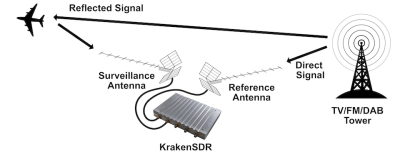Open-Source Passive Radar Taken Down For Regulatory Reasons
Open source technology brings a world for which laws and regulations are not fully prepared. As a result, from time to time open projects have to work around government regulations. In today’s news, The KrakenRF team ran into a legal obstacle to arms trafficking for their passive radar code based on KrakenSDR and is currently figuring it out. There is no indication that there has been any legal action from the US government – the team is proactive, as fast as we are told.
The KrakenSDR hardware, to put it very simply, is five RTL-SDRs on one PCB – with a lot of work to do it the right way. You need a lot more than a couple of dongles – it has a shielded housing, suitable connectors, reliable power distribution, a suitable USB hub and, importantly, hardware to synchronize the receiver. Naturally, there are nice things you can build with such a solid package – one of them being the passive radar, which was a prominent selling point on both KrakenSDRs page before launching in 2021, and on their crowdfunding page just a week ago. How does this happen?
There are radio frequency emissions floating around you in the air unless you are at sea or in the desert. Whether it’s airplane transponders, cell towers, or a crappy switch mode power supply, emitted radio waves interact with objects all around you. If you have multiple receivers with directional antennas, you can pick up waves reflected from an object, compare the reflected wave with that received from the original source, and determine the object’s properties such as location and speed. If you want to know more, IEEE Spectrum has looked at this thread just a week agoand previously deleted ones KrakenSDR wiki page there are more details to learn from.
By exhibiting at IEEE Spectrum, KrakenSDR’s work received a lot of attention and comments. And this is where International Traffic in Arms Regulations (ITAR) laws enter. We are not lawyers, but it does passive radar seems to be on the list. Today, the code repository and documentation pages have been cleaned up while the team talks to legal experts.
Dealing with this is embarrassing and we wish them the best of luck in getting this resolved by law. In the bad old days, some encryption algorithms were known in the scope, which seemed absolutely ridiculous to us at the time. Eventually, the laws changed to better reflect reality, but the wheels of justice turn slowly.


Comments are closed.